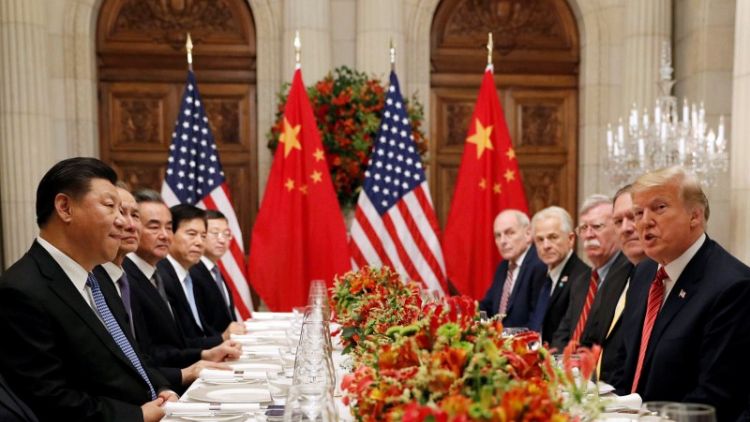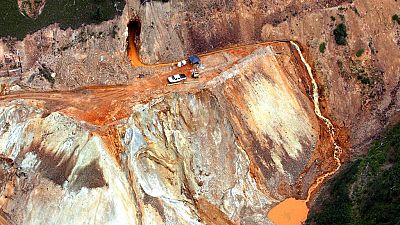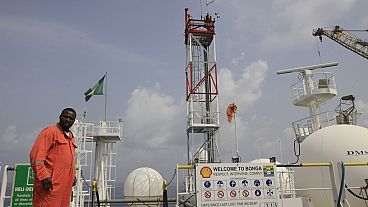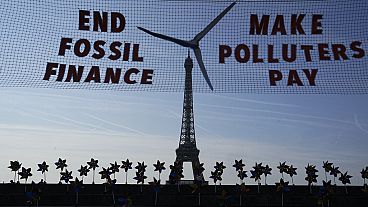By Daniel Flynn and Cassandra Garrison
BUENOS AIRES (Reuters) - The leaders of the world's largest economies on Saturday backed an overhaul of the global body that regulates international trade disputes, ahead of high-stakes talks between U.S. President Donald Trump and Chinese President Xi Jinping aimed at defusing a trade war.
The Group of 20 industrialized nations called for reforms to the crisis-stricken World Trade Organization in a final statement from a two-day gathering in Argentina, marking a victory for Trump's drive to overhaul the trade body.
Officials expressed relief that agreement on a final statement was reached after negotiators worked through the night to overcome differences over language on climate change.
The final text recognised trade as an important engine of global growth but made only a passing reference to "the current trade issues," after the U.S. delegation won a battle to keep any mention of protectionism out of the statement.
In addition to tariffs on Chinese goods, Trump has imposed tariffs on steel and aluminium imports into the United States this year. Numerous countries have filed litigation at the WTO to contest the levies.
The United States is unhappy with what it says is the WTO's failure to hold Beijing to account for not opening up its economy as envisioned when China joined the body in 2001. The European Union is also pushing for sweeping changes to how the WTO operates.
"Notwithstanding our differences, we have been able to agree a path forward at the G20," French President Emanuel Macron told a news conference. "The United States has endorsed a clear multilateralist text."
G20 delegates said negotiations on the final summit statement proceeded more smoothly than at a meeting of Asian leaders two weeks ago, where disagreements on protectionism and unfair trading practices prevented a consensus.
European officials said a reference to refugees and migration - a sensitive issue for Trump's administration - was excised to ensure consensus.
On climate change, the United States once again marked its differences with the rest of the G20 by reiterating in the statement its decision to withdraw from the Paris Agreement and its commitment to using all kinds of energy sources.
The other members of the group reaffirmed their commitment to implement the Paris deal and tackle climate change, taking into account their national circumstances and relative capabilities.
XI AND TRUMP
With the United States and China locked in growing disputes over commerce and security, global financial markets next week will take their lead from the outcome of talks between Trump and Xi on Saturday.
The first day of the G20 summit offered glimmers of hope for progress between Washington and Beijing despite Trump’s earlier threat of new tariffs, which would increase tensions already weighing on the growth of the global economy.
But ahead of what is seen as the most important meeting of U.S. and Chinese leaders in years, both sides said differences remained, and the outcome of the talks were uncertain.
Saturday's Trump-Xi dinner will be a test of the personal chemistry between the two leaders, which Trump has hailed as a warm friendship.
Beijing hopes to persuade Trump to abandon plans to hike tariffs on $200 billion (£156.8 billion) of Chinese goods to 25 percent in January, from 10 percent at present. Trump has threatened to go ahead with that and possibly add tariffs on $267 billion of imports if there is no progress in the talks.
A Chinese foreign ministry official in Buenos Aires said there were signs of increasing consensus ahead of the discussions but that differences persisted.
Trump has long railed against China's trade surplus with the United States and Washington accuses Beijing of not playing fairly on trade. China calls the United States protectionist and has resisted what it views as attempts to intimidate it.
The two countries are also at odds militarily over China’s extensive claims in the South China Sea and U.S. warship movements through the highly sensitive Taiwan Strait.
IMF Managing Director Christine Lagarde said that high levels of debt accumulated by emerging market nations was a pressing concern.
"There is an urgent need to de-escalate trade tensions, reverse recent tariff increases, and modernize the rules-based multilateral trade system," she said.
U.S. officials said a call by G20 leaders for the International Monetary Fund and World Bank to improve monitoring debt levels was aimed at ensuring that developing economies did not become to heavily indebted to China in return for infrastructure projects.
U.S. officials, including Vice President Mike Pence, have warned about China's increasing influence across swathes of the developing world, including Latin America. G20 summit host Argentina is expected to sign a series of deal with China on Sunday during a one-day state visit by Xi.
Apart from trade and climate change, Russia's seizure of Ukrainian vessels drew condemnation from other G20 members, while the presence of Crown Prince Mohammed bin Salman at the summit raised an awkward dilemma for leaders.
Saudi Arabia's de facto ruler arrived amid controversy over the killing of Saudi journalist Jamal Khashoggi, though Saudi officials have said the prince had no prior knowledge of the murder.
While Prince Mohammed was largely sidelined by other leaders at public events, the leader of the OPEC heavyweight had a series of bilateral meetings, including a closely watched encounter with Putin.
(Reporting by Roberta Rampton, Michael Martina, Matt Spetalnick, Maximilian Heath, Scott Squires, Cassandra Garrison, Daniel Flynn and Kylie Maclellan in Buenos Aires; Writing by Matt Spetalnick and Daniel Flynn, Editing by Ross Colvin and Alistair Bell)



